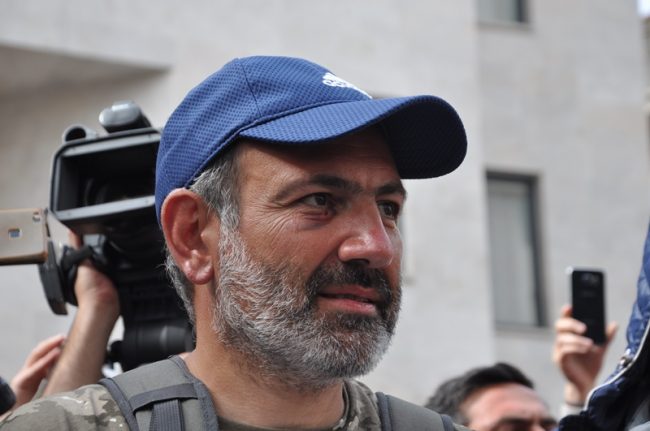

 Armenia’s ruling Republican Party (RPA) have declared that they will not put forward their own candidate for prime minister and will not try to prevent opposition leader Nikol Pashinyan from being appointed. The country’s parliament, the National Assembly, is due to select a new Prime Minister on 1 May following the resignation of Serzh Sargsyan, amidst weeks of street protests against his rule.
Armenia’s ruling Republican Party (RPA) have declared that they will not put forward their own candidate for prime minister and will not try to prevent opposition leader Nikol Pashinyan from being appointed. The country’s parliament, the National Assembly, is due to select a new Prime Minister on 1 May following the resignation of Serzh Sargsyan, amidst weeks of street protests against his rule.
‘Taking into account the domestic political situation, the RPA has always said that its priority is the state interest, the fatherland’s interest, the security of Armenia and Artsakh [Nagorno-Karabakh], and domestic stability. Guided by these challenges and priorities, the RPA decided that the RPA faction of the National Assembly will not nominate a candidate for Prime Minister’, party spokesperson Eduard Sharmazanov said on Saturday.
On Sunday, the leader of the Republican faction in parliament, Vahram Baghdasaryan, clarified that the party would not try to prevent ‘the people’s candidate’, referring to Pashinyan, from being elected, and would not boycott the appointment. The statement followed a meeting earlier that day with Pashinyan, who has been leading the anti-government protests.
‘If the three other political forces represented in the National Assembly have a joint candidate […] we will not block the candidate whom they will call the people’s candidate’, RFE/RL’s Armenian service quoted Baghdasaryan as saying.
The Republican Party holds a majority of 58 seats of 105 in Armenia’s parliament, the National Assembly. The opposition, consisting of Tsarukyan’s Prosperous Armenia Party, the Yelk (Way Out) block, of which Pashinyan’s Civil Contract Party is a part, and the Armenian Revolutionary Federation, hold 47 seats in total. All three parties have now declared support for Pashinyan’s candidacy.
The deadline for parliamentary factions to nominate their candidates runs out at 18:00 on Monday. According to Hetq, the National Assembly will elect a prime minister by a majority vote. If that doesn’t happen, a a second attempt will be made a week later. A subsequent failure to appoint a prime minister would result in the dissolution of the National Assembly, leading to snap elections.
During a rally on Sunday in Yerevan’s Republic Square, Pashinyan declared his readiness to take up the post of Armenia’s prime minister ‘in a responsible manner’.
A ‘Velvet Revolution’
Small protests loosely organised around the slogan ‘No to Serzh’ began in March. Since 13 April, tens of thousands have come out to the streets daily in what Pashinyan has called a ‘velvet revolution’. The protests were initially limited to opposing former president Serzh Sargsyan’s appointment as Prime Minister, but their demands have now expanded to include a new government from outside the ruling Republican Party, and new elections to be held under a new electoral code.
OSCE observers noted that the previous parliamentary elections, in 2017, were ‘tainted by credible information about vote-buying, and pressure on civil servants and employees of private companies’.
Following constitutional changes passed in 2015, Armenia’s parliament, the National Assembly, is now in charge of electing the prime minister. With Armenia’s shift from a semi-presidential to a parliamentary system, the prime minister is the most powerful position in the country.
Having previously played down suggestions he would run again for political office, Sargsyan, having served the maximum 10 years as president, announced on 11 April that he would seek the position of Prime Minister. On 17 April, he was sworn in as PM by Armenia’s parliament, the National Assembly. He resigned on 23 April after 11 days of protests.









